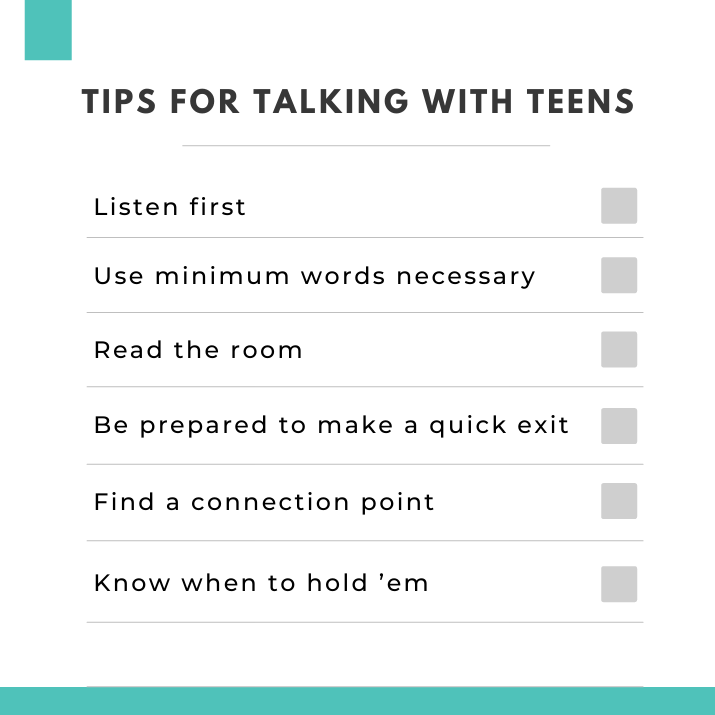
While this post is called talking with teenagers it really should be called listening to and reading teenagers! In the PWK survey, the topic of teenagers was a prominent answer to the question about what readers would like to see me write about on the blog this year.
I can completely understand this as parenting teenagers can be challenging and there is not as much personal experience based info on teenagers compared to younger kids. Some of the harder years of parenting for me was when our eldest was in year 9 and 10. It wasn’t because he was doing anything out of the norm or doing anything really wrong but it was because I wasn’t keeping pace with his developmental change and my parenting skills for this age really needed work.
Our eldest taught me a great deal about what a teenager needs from their parents and what they don’t need. He definitely made the path easier for his siblings as I played catch up through his teenage years and became better at parenting teens.
Being able to talk with your teen is fundamental to keeping a healthy relationship through their teenage years. However, each of the tips below starts with a verb showing that talking with your teen is much more than just words.
Listen first
Teenagers will frequently ask to do things they are not allowed to do, they will behave in ways that seem to have no thought behind them (probably because there wasn’t!) and they will want to challenge things you say often. You can unconsciously become programmed to answer no straight away, to tell them off, and to shut them down when they are talking back to you but when we do this we are not validating how they are feeling. Whether the feelings or actions are justified we need to actively listen to what they have to say. (Of course, if they are speaking rudely we need to ask them to speak to us respectfully.)
Actively listening means that we are not simply waiting for them to finish talking so we can then say exactly what we want but it means tuning in to them and trying to see things from their perspective. Actively listening to your teen can help prevent situations from escalating, validate their feelings and while they may not get what they want, they at least know their voice has been heard.
Use the minimum words necessary
I love to chat and have a tendency to overtalk. Overtalk and teenagers do not go well, nor does repeating yourself! In my early days of parenting teens, I would often repeat the key points to be sure they understood exactly what I meant. Teens are often defensive when they are in the wrong and repeating yourself to them generally just gets them super frustrated as does giving in-depth explanations. I thought that if I could give a detailed explanation about why I was unhappy or about the consequences of their behaviour it would be helpful to them. It wasn’t.
Teens are smart and most of the time after the fact they will know what was wrong with their actions or words and they don’t want to hear mum keep banging on about it. Now I find I have much greater success saying what I need to say with the minimum amount of words and just saying it once. If I want to check if they understand I just ask them if they understand me. This works better than me simply repeating myself because they have a non-responsive look on their face.
I wish I could say I do this all of the time but I don’t! Sometimes my frustration gets the better of me and I get too wordy and repetitive and this always ends up extending the time to resolution. Our current 15 year old though is doing a great job of getting me to stop because he just interrupts me and tells me he understands and I don’t need to say it again!
Read the room
Finding times to talk to teens just to connect can require you to be reading the room to find those opportunities. Just because we feel like a chat and have time to do it doesn’t mean that this will work for the teen. I now know not to take this personally and take mental notes of their body language and other signals that they give off that indicate they don’t want to chat.
Likewise, it can take time to recognise the signals from your teen that they are up for a chat. The times they want to chat might not be convenient but if you have a teen who is not a big chatter you need to jump on the chance and chat while they are open to it. Making sure you stop what you are doing and engaging fully is important when they offer up these opportunities.
If you have important issues to discuss with the teen, finding the right moment can help at least get the conversation off on the right foot too. For our 15 year old for example, he likes to have time on his own after school before jumping into any sort of conversation, so I certainly don’t bring up anything important with him then.
Be prepared to make a quick exit
If I haven’t read the room well and I start a conversation with the teen and the vibe is off, if the conversation isn’t an essential one, I am always prepared to exit the conversation and try again at a later point. Of course, sometimes the conversation does have to be had, and if I have to push through with the conversation with an unwilling teen, the first points of active listening and keeping words to a minimum become even more important.
Find a connection point
There are stages of parenting teens where it feels like they are constantly pushing the boundaries and the majority of conversations you have with them are around what they are or are not doing. This doesn’t make for a harmonious relationship if these are your only points of conversation with them! Finding some connection points with your teen is critical – something that they are really interested in and enjoy that you can also take interest in. This has been different for all our teens, it has been things like music, politics, fitness, and football.
I have also found it is important to be interested in other things they like that I am not that keen on, like gaming for example. A couple of our teens have been quite into gaming, something that I have no interest in at all. But I learnt through my first teen that even if I don’t like it, I don’t need to tell them that or demonise the activity they like. So while I am still not a massive fan of gaming I will ask about what games the 15 year old is playing and ask him to explain a bit about what the game involves etc and do it without judgement, appreciating this is something important to them.
Know when to hold ’em
No matter how much of a tough exterior your teenager has the reality is they are very sensitive and it is important to remember this when we are talking with teens. Sometimes when they are opening up about things and they share with you something that has turned out badly for them, holding back the critical feedback is important. This allows them to talk about how they are feeling and through this they are often able to reflect on what they could have done differently. They don’t need an “I told you so” or a solution, they just need you to listen and empathise. You can always plan to come to talk about other things at a later time.
And sometimes teens just literally need to be held. They need to feel your love and know you support them. Not all teens may go for a full embrace (some of mine are not big huggers) so simply placing your arm around their shoulder or hand on their arm is enough for them to know you are there for them.
What other tips would you give for talking with teens?
This post is part of a series where I answer questions from readers. You can read previous answers to readers’ questions here.

